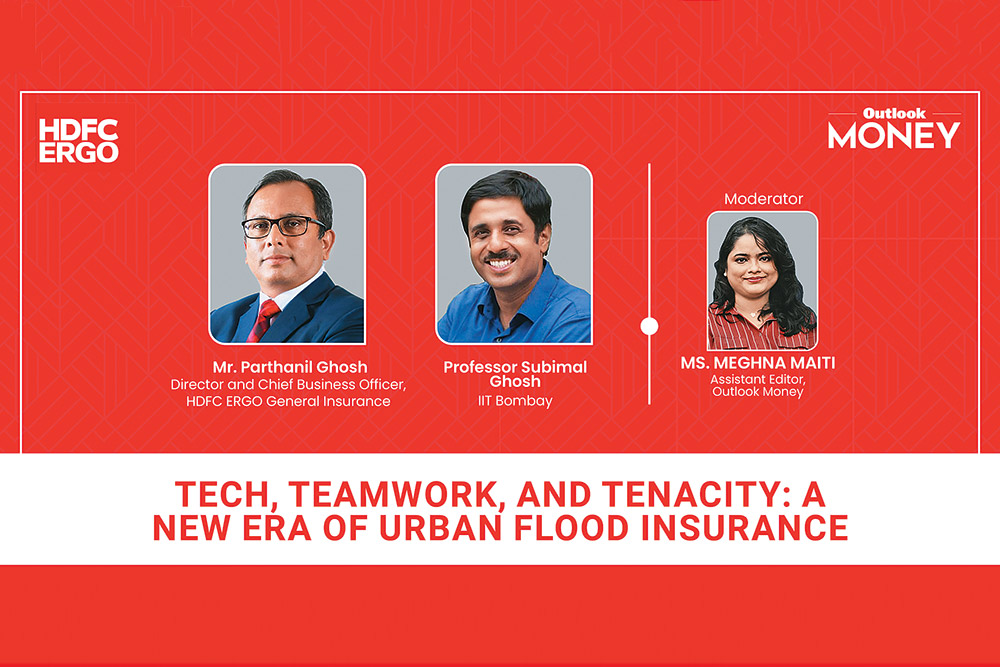On May 10, 2024, Outlook Money hosted an insightful webinar featuring Mr. Parthanil Ghosh, Director and Chief Business Officer of HDFC ERGO General Insurance, and Professor Subimal Ghosh from IIT Bombay. Moderated by Meghna Maiti, Assistant Editor of Outlook Money, the discussion delved into a critical initiative to tackle urban flooding in Mumbai through a collaboration between HDFC ERGO and IIT Bombay.
A Crucial Collaboration
Mr. Parthanil Ghosh began by highlighting the significant objectives of the collaboration, established in 2021, which aims to mitigate urban flooding risks in Mumbai. The partnership leverages cutting-edge research, technology, and expertise to address the pressing issue of urban flooding, which has profound implications for public health, infrastructure, and the economy. “Our goal is to assess damage, identify suitable insurance outcomes, and empower authorities with preemptive measures to safeguard lives and assets,” stated Ghosh.
Innovative Approaches to Risk Assessment
Professor Subimal Ghosh elaborated on the methodologies employed in the project. He emphasized the importance of understanding the intensification of extreme precipitation due to climate change, particularly in urban areas like Mumbai, which faces unique challenges due to its coastal location and monsoon gateway status. Ghosh explained, “We rely on crowd-sourced information and advanced forecasting systems to provide real-time flood information and forecasts. This citizen science approach is crucial for effective urban flood management.”
The Role of Insurance
Mr. Ghosh discussed the role of insurance companies in addressing urban flooding. He emphasized the use of technologies such as AI, machine learning, and predictive modeling to assess evolving risks and tailor insurance products accordingly. “Better underwriting and pricing, prevention measures, and long-term sustainability are key areas where insurance can make a significant impact,” he noted. Ghosh highlighted the importance of collaboration with local authorities to implement effective urban planning strategies and disaster preparedness initiatives.
Advanced Technologies in Flood Management
Professor Ghosh detailed the integration of remote sensing, GIS, and machine learning in developing geomap advisories for urban flooding. He acknowledged the challenges of obtaining high-resolution data and the need for continuous model updates. “By merging urban flood models with crowd-sourced data, we aim to provide accurate real-time flood monitoring and forecasting,” he explained. This approach ensures that the system is reliable and effective in informing citizens and authorities.
Contributing to Disaster Preparedness
The collaboration’s outcomes are expected to influence policy frameworks and regulatory approaches to disaster risk reduction and resilience building in urban settings. Professor Ghosh emphasized the need for an improved early warning system and the development of high-resolution vulnerability maps. “Identifying high-risk zones and issuing timely advisories can significantly enhance urban resilience,” he concluded.
Conclusion
The webinar underscored the importance of collaboration between academia, industry, and local authorities in addressing urban flooding. The initiative by HDFC ERGO and IIT Bombay is a commendable step towards building a safer, more resilient Mumbai. As Mr. Ghosh aptly put it, “Prevention is better than cure. By predicting and preventing the damage, we can protect lives and properties effectively.”
Disclaimer
Insurance is a subject matter of solicitation. The information provided in this webinar cannot substitute for the advice of a licensed professional. The information and data provided on this webinar is of a general nature and strictly for informational purposes.







